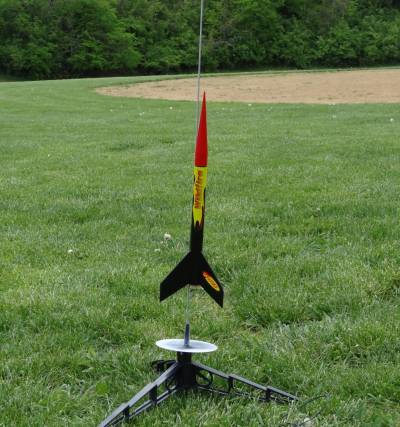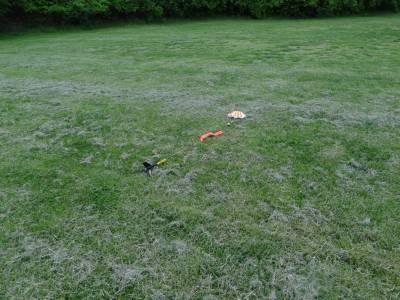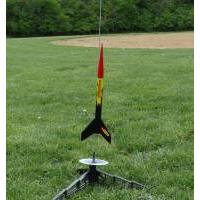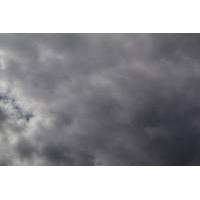| Construction Rating: | starstarstarstarstar_border |
| Flight Rating: | starstarstarstarstar |
| Overall Rating: | starstarstarstarstar_border |
| Published: | 2013-05-10 |
| Manufacturer: | Estes  |
Brief
I bought my original Wildfire from Ebay for the sole purpose of canibalizing the nose cone to clone a Satellite Interceptor. One night while bored I decided to build the rest of the rocket which I mated with a PNC-50 nose cone that I had no other use for at the time. When finished, I found that I had anything but the disposable rocket that I anticipated, and finished the paint and decals as intended. The rocket lasted but three flights before treeing itself at B6-4 Field. Though I tried, I never again found one on Ebay, but later bought one off of a friend who was thinning his herd of unbuilt kits. I promise I'll be more careful this time.
Components
- Slotted BT-50 body tube
- PNC-50BB nose cone
- BT-20J engine tube
- CR-2050 centering rings (2)
- EH-2A engine hook
- balsa fin stock
- 12" parachute
- 1 3/16" x 18" streamer
- elastic shock cord
- LL-2A launch lug
- decal
Construction
A true 3fnc rocket, but one with the added benefit of through-the-wall (TTW) fins, the Wildfire is an easy build with but one potential "gotcha". Since this is a skill level 1 rocket, I think it's worth noting that the instructions should be followed TO THE WORD when building and installing the engine mount. The TTW fins have a tab on them that has to slip into a slot in the body tube and between the centering rings. (I had no problem with this, but I can see myself "freelancing" and winding up with a centering ring in the wrong place.) Other than that, and even with that, construction is a simple process.
Finishing
Finishing the Wildfire is simple, but the result is a great looking rocket. I had discovered the wonders of Elmer's Fill & Finish by the time I undertook this project, so it came out looking great, which was a big part of my five star impression. After killing off the balsa grain and tube spirals with F & F, the whole rocket was sprayed with Valspar white primer. The body tube then received two coats of Valspar gloss black while the nose and tail cone received two coats of Valspar Cherry Red. The kit has stickers instead of decals, but they're a cool flame pattern and look great on the completed bird.
Flight
First flight was at VOA park, but despite the size of the field, I still only chose a B6-4 for the flight. The flight was high and straight, and the breeze took the rocket for a long drift into the early spring weeds. This was the flight that made enough of an impression on me that I applied the decals when I got home.
The next flight was also on a B6-4, but at a local soccer complex near the river that is ringed with trees. Again the flight was high and straight, and again the breeze caused a drift to within a few feet of the trees at the field edge.
I had obviously learned my lesson for the third flight, an A8-3 powered flight at B6-4 Field. What I hadn't learned at that point was the Wildfire's habit of drifting excessively after ejection. This time it cost me. The Wildfire drifted to the edge of the field and into the clutches of a tree, 20+ feet up. (The same tree that ate Sam's new GI Joe on his first Bail Out flight.) It didn't look like it was going to be a difficult retrieval, but I couldn't make it back to the field until the next afternoon. By the time I returned, it was gone. (Hopefully to a kid who used it as his entry to the hobby.)
Several years later the Wildfire made a triumphant return to B6-4 Field. As the third flight of the day coming after the only tragedy of the day, (a Quest Antari that did a "now you see it, now you don't" trick,) the A8-3 flight was a nice high flight that began drifting as it caught the breeze on recovery, luckily away from the tree that ate the predecessor. It landed on the lower field across the rushing waters of CATO Creek. As I was recovering it, I happened to look to the right and spotted a flash of orange that had no business in the right field area of 1/2A6-2 Field. It was the Antari.
Recovery
The Wildfire was interesting in that it had a combination recovery system, a parachute with a streamer. I've never seen it before or since and I'm tempted to think that it was more of a cosmetic affectation rather than an actual performance booster, but it looks kind of cool in the air.
Summary
Pro: Great looks and simple construction. Impressive performance. TTW fins.
Con: Sticker decal and a short shock cord.
Other Reviews
- Estes Wildfire By Dustin Deckard
Brief This rocket has an interesting recovery. It has a parachute and a streamer. I think it's kinda cool. Construction This rocket was in a plastic bag. All the parts were there and none were broken. It consists of: nose cone, 3 balsa fins, streamer, 12 inch parachute, shock cord, paper shock cord mount, launch lug, 2 centering rings, decal sheet, engine hook and a BT- 50 body tube. The ...
 |
 |
Flights
Date | Flyer | Rocket | Altitude |
|---|---|---|---|
2021-08-14 | Bill Eichelberger | Estes - Wildfire | 1,000 Feet |
2013-05-04 | Bill Eichelberger | Estes - Wildfire | 300 Feet |
2002-08-08 | Bill Eichelberger | ****Estes - Wildfire | - |
2002-06-03 | Bill Eichelberger | ****Estes - Wildfire | - |
2002-05-19 | Bill Eichelberger | ****Estes - Wildfire | - |
Sponsored Ads
 |
 |
















